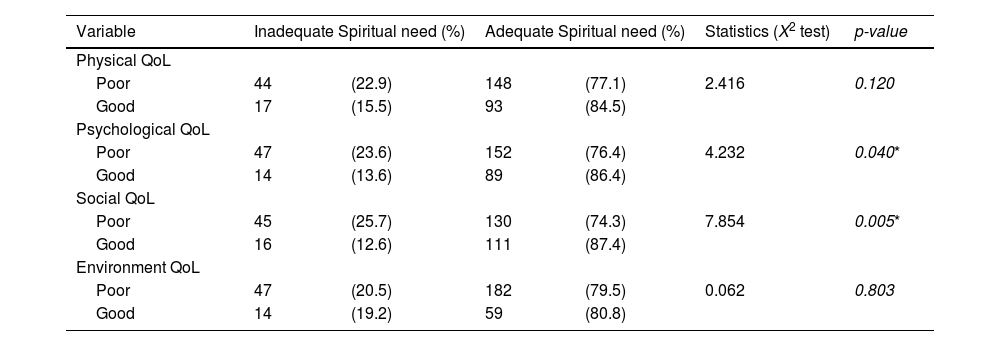In Africa, cancer is considered a death sentence. Its impact can be debilitating for the patient and those who care for them. This study therefore assessed the spiritual needs and Quality of life of Cancer patients in a tertiary hospital in Nigeria.
MethodsThis study utilized a cross-sectional descriptive design. We systematically recruited 302 cancer patients who visited the cancer registry and outpatient departments. A standardized and validated Spiritual needs questionnaire (SpNQ) and WHO Quality of Life (WHOQL) were used to collect data. Data was analyzed with SPSS version 23 with a significance level set at p < 0.05.
ResultsThe preponderance cancer among respondents was breast cancer 146 (48.4%) followed by prostate cancer 41 (13.6%). Most of the respondents admitted having “strong” spiritual needs. Categorization of the spiritual need score was below average in 20% of the respondents which indicated those with low spiritual needs and the majority 241 (79.8%) of the patients had high spiritual needs. Most respondents had poor quality of life in all four domains. The spiritual care needs of respondents were significantly associated with the quality of life of the respondents particularly in the psychological domain (p = 0.040) and social domain (p = 0.005).
ConclusionThis study revealed high spiritual needs and poor quality of life among cancer patients. Healthcare practitioners should provide for the spiritual needs of cancer patients to enhance their quality of life.
En África, el cáncer se considera una sentencia de muerte. Su impacto puede ser debilitante tanto para el paciente como para quienes lo cuidan. Por lo tanto, este estudio evaluó las necesidades espirituales y la calidad de vida de los pacientes con cáncer en un hospital terciario en Nigeria.
MétodosEste estudio utilizó un diseño descriptivo transversal. Reclutamos sistemáticamente a 302 pacientes con cáncer que visitaron el registro de cáncer y los departamentos ambulatorios. Para recopilar datos se utilizó un cuestionario de necesidades espirituales (SpNQ) estandarizado y validado y un cuestionario de calidad de vida de la OMS (WHOQL). Los datos se analizaron con SPSS versión 23 con un nivel de significancia establecido en p < 0.05.
ResultadosEl cáncer preponderante entre los encuestados fue el cáncer de mama 146(48,4%) seguido del cáncer de próstata 41(13,6%). La mayoría de los encuestados admitieron tener necesidades espirituales “fuertes”. La categorización de la puntuación de necesidad espiritual estuvo por debajo del promedio en el 20% de los encuestados, lo que indicó que aquellos con baja necesidad espiritual y la mayoría 241(79,8%) de los pacientes tenían altas necesidades espirituales. La mayoría de los encuestados tenían una mala calidad de vida en los cuatro dominios. Las necesidades de atención espiritual de los encuestados se asociaron significativamente con la calidad de vida de los encuestados, particularmente en el dominio psicológico (p = 0,040) y social (p = 0,005).
ConclusiónEste estudio reveló altas necesidades espirituales y mala calidad de vida entre los pacientes con cáncer. Los profesionales de la salud deben atender las necesidades espirituales de los pacientes con cáncer para mejorar su calidad de vida.











